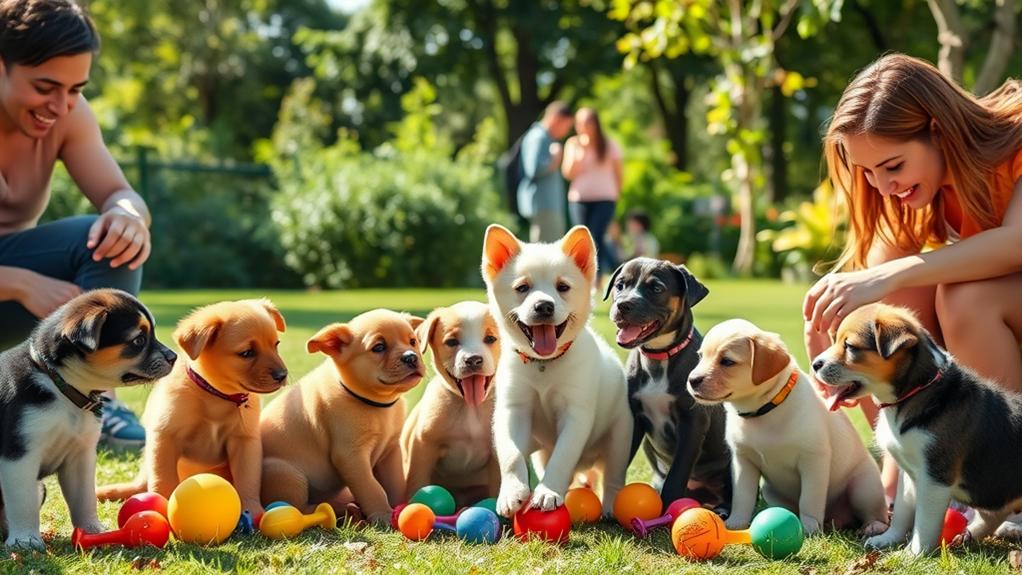When you bring a puppy into your home, you might not realize just how essential those early weeks are for their development. Socializing your puppy between 3 to 14 weeks can shape their personality and behavior for life. You'll find that exposing them to different people, environments, and other animals not only builds their confidence but also reduces potential behavioral issues down the line. Understanding these benefits can transform your approach to puppy care, but there's more to think about the methods and timing to guarantee the best outcomes for your furry friend.
Understanding Puppy Socialization
How do you define puppy socialization? Simply put, it's the process of exposing your puppy to various people, environments, and experiences in a positive and controlled way.
This essential phase helps shape their behavior and personality, ensuring they grow into a well-adjusted adult dog. When you think about socialization, consider it as giving your puppy the tools they need to navigate the world confidently.
You'll want to introduce your puppy to different sights, sounds, and smells, as well as other animals and humans.
This exposure helps your furry friend understand that new experiences aren't something to fear. It's important to make these encounters positive; use treats and praise to reinforce good behavior during these interactions.
Critical Socialization Period
The critical socialization period for puppies occurs between 3 and 14 weeks of age, marking a pivotal window for their development. During this time, your puppy's brain is highly receptive to new experiences, and exposure to various stimuli can shape their behavior for life.
It's essential to introduce your puppy to different people, environments, sounds, and other animals, as this helps them become well-adjusted adults. If you miss this window, your puppy might develop fears or anxieties that can persist into adulthood.
This period is when they learn how to interact with their world, so the experiences you provide are foundational. It's not just about meeting other dogs; it's also about engaging with various textures, sights, and sounds.
Make each experience positive and rewarding, ensuring your pup feels safe and secure. Playdates, puppy classes, and safe outings can all be part of this learning phase.
Benefits of Early Exposure
Consistently exposing your puppy to new experiences during their critical socialization period can lead to numerous lifelong benefits. When you introduce your puppy to different environments, sounds, people, and other animals, you're helping them develop a well-rounded perspective of the world. This exposure reduces the likelihood of behavioral problems later on, such as fearfulness or aggression.
Early exposure fosters adaptability, making it easier for your pup to handle changes in their environment. Whether it's meeting new people at the park or encountering various types of pets, these experiences teach your puppy to remain calm and confident.
You'll notice that a well-socialized puppy tends to be more curious and willing to explore new situations. Additionally, early exposure promotes better training outcomes. When your puppy is comfortable in diverse situations, they're more focused and receptive during training sessions.
This leads to quicker learning and a stronger bond between you and your furry friend.
Building Confidence in Puppies
Confidence is essential for your puppy's overall development and well-being. When your puppy feels secure in their environment, they're more likely to explore, learn, and interact positively with others. Building this confidence starts with early socialization.
Expose your puppy to various people, pets, and situations. This helps them learn that the world is a safe place. Use positive reinforcement, like treats and praise, to encourage bravery. For instance, if your puppy encounters a new dog, reward them for calm behavior. This reinforces their confidence.
It's also important to create a routine. Regular activities, like walks or playdates, help your puppy understand what to expect. Consistency fosters a sense of security, allowing your puppy to thrive in unfamiliar situations.
Don't forget to introduce new experiences gradually. Overwhelming your puppy can lead to fear instead of confidence. Instead, take baby steps.
Lastly, be patient. Confidence builds over time, and every puppy is different. Celebrate small victories, like your pup approaching a new person or exploring a new park. With your support, your puppy will grow into a self-assured and happy companion.
Reducing Behavioral Issues
Addressing behavioral issues early on can make a significant difference in your puppy's development. When you expose your puppy to various environments and situations, it helps them learn how to respond appropriately. This proactive approach can prevent many common behavioral problems from developing later on.
By engaging in early socialization, you can reduce issues like excessive barking, chewing, or fear-based reactions. Here's a quick overview of some common behavioral issues and how early socialization helps:
| Behavioral Issue | Socialization Benefit |
|---|---|
| Excessive Barking | Teaches appropriate responses to stimuli |
| Destructive Chewing | Redirects energy through play and interaction |
| Fear of New Environments | Builds confidence in unfamiliar settings |
| Aggression Towards Strangers | Promotes positive interactions with people |
Socializing With Other Dogs
One of the key components of your puppy's socialization is interacting with other dogs. This experience is essential for teaching your pup how to communicate and behave appropriately in canine society.
When your puppy meets other dogs, they learn to read body language, understand social cues, and develop proper play etiquette.
To make the most of these interactions, start with well-mannered, vaccinated dogs. Supervise play sessions closely to guarantee everything stays safe and positive. If your puppy seems overwhelmed, don't hesitate to give them a break. Gradually, they'll become more comfortable and confident.
Consider enrolling your puppy in a dog training class or visiting local dog parks. These environments offer structured opportunities for socialization. Your puppy will encounter various sizes, breeds, and temperaments, helping them adapt to different situations.
Introducing New Environments
Introducing your puppy to new environments is essential for their overall socialization and development. When you expose your pup to different settings—like parks, busy streets, or even your local pet store—you help them become more adaptable and confident. Each new experience teaches them how to navigate various stimuli, such as noises, crowds, and unfamiliar objects.
As you explore these environments together, your puppy learns to associate new sights and sounds with positive experiences. This can reduce fear and anxiety in the long run. Remember to keep these outings short and enjoyable, so your puppy doesn't become overwhelmed.
Variety is key, so try visiting different locations regularly. Each new environment presents unique challenges that can help build your puppy's resilience. For instance, walking on different surfaces, like grass, gravel, or pavement, will enhance their comfort and adaptability.
Be observant during these outings; watch for signs of stress or discomfort. If your puppy seems anxious, take a step back and verify they feel safe.
The goal is to create a well-rounded, confident dog who can thrive in any situation. By introducing new environments early on, you're setting the foundation for a well-adjusted adult dog.
Tips for Successful Socialization
How can you guarantee your puppy thrives during socialization? Start early—ideally between 3 to 14 weeks. This is when your pup's brain is most receptive to new experiences. Expose your puppy to various people, pets, and environments. Each encounter helps build confidence.
Keep sessions short and positive. Puppies have limited attention spans, so aim for 5-10 minute interactions. Ascertain each experience is fun; use treats and praise to reinforce good behavior. If your puppy seems overwhelmed, take a step back and allow them to acclimate before continuing.
Introduce your pup to different situations gradually. Visit parks, pet stores, or friends' homes. Encourage safe interactions with other dogs. Always supervise these playdates to ascertain safety and comfort.
Be patient and consistent. Socialization isn't a one-time event but an ongoing process. Regularly expose your puppy to new experiences throughout their first year to reinforce the skills they've learned.
Conclusion
In the grand tapestry of your puppy's life, early socialization weaves vibrant threads of confidence and adaptability. By exposing them to diverse experiences, you're not just shaping a well-rounded dog; you're crafting a loyal companion ready to embrace the world. So, let your puppy frolic through new environments and dance with other dogs. With each positive encounter, you're nurturing a bond that will blossom like a flower, ensuring a lifetime of joy and harmonious adventures together.



